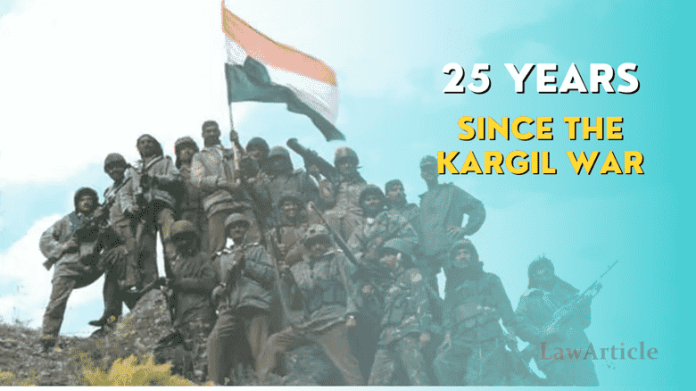Introduction
The Kargil War, also known as the Kargil conflict, was a pivotal military engagement between India and Pakistan that took place between May and July 1999. This conflict, fought in the rugged terrains of the Kargil district in Jammu and Kashmir, drew significant international attention and had profound legal and diplomatic implications. The war highlighted critical issues related to international law, the conduct of hostilities, and the adherence to bilateral agreements. This article explores the legal perspectives surrounding the Kargil War, examining the violations, implications, and consequences from a legal standpoint.
Background
The conflict began when Pakistani soldiers and militants crossed the LoC, occupying strategic heights in the Kargil sector. The intrusion was detected by Indian forces, leading to intense fighting over several weeks. The war ended with India regaining control over the occupied territories and Pakistan facing international condemnation.
Breach of the Simla Agreement (1972)
The Simla Agreement, signed by India and Pakistan in 1972, aimed to lay the foundation for peaceful coexistence and mutual respect for each other’s territorial integrity. One of the key components of this agreement was the recognition of the Line of Control (LoC) as the de facto border between the two nations in the disputed region of Jammu and Kashmir.
- Violation of Territorial Integrity: The Kargil intrusion by Pakistani forces and militants represented a direct violation of the Simla Agreement. By crossing the LoC and occupying Indian territory, Pakistan breached the terms of the agreement that both nations had pledged to honor.
- Impact on Bilateral Relations: The violation of the Simla Agreement strained the already fragile relationship between India and Pakistan, leading to increased mistrust and animosity. The breach underscored the difficulty in maintaining bilateral agreements without robust verification and enforcement mechanisms.
International Humanitarian Law (IHL)
International Humanitarian Law, also known as the law of armed conflict, governs the conduct of hostilities and the protection of individuals during war. The Kargil War raised several concerns related to IHL.
- Principle of Distinction: IHL mandates that parties to a conflict must distinguish between combatants and non-combatants and between military objectives and civilian objects. The mountainous terrain of Kargil, with its sparse civilian population, mitigated large-scale civilian casualties. However, the principle of distinction remained critical, especially in targeting military positions that could be near civilian areas.
- Principle of Proportionality: IHL also requires that the harm caused to civilians or civilian property must be proportional to the direct military advantage anticipated. During the Kargil War, the use of artillery and airstrikes in difficult terrain posed challenges in adhering to this principle, although efforts were made to minimize collateral damage.
- Treatment of Prisoners of War (POWs): The conflict involved the capture of soldiers, bringing into focus the Geneva Conventions on the treatment of POWs. Both nations were obligated to treat captured soldiers humanely and ensure their rights under international law.
United Nations and International Response
The United Nations (UN) plays a crucial role in maintaining international peace and security. During the Kargil War, the UN’s involvement was significant in several ways.
- Calls for Restraint: The UN Secretary-General, Kofi Annan, and various member states called for restraint and a peaceful resolution to the conflict, emphasizing the need to respect international borders and agreements. This reflected the UN’s commitment to upholding international peace and the principles of the UN Charter.
- Diplomatic Efforts: The UN’s diplomatic efforts, along with pressure from the international community, were instrumental in bringing about a cessation of hostilities. The involvement of influential countries, particularly the United States, exerted significant diplomatic pressure on Pakistan to withdraw its forces from the occupied territories.
International Law Violations
The Kargil conflict involved multiple violations of international law, particularly those enshrined in the UN Charter and customary international law.
- Violation of Sovereignty: Pakistan’s incursion into Indian territory was a clear violation of India’s sovereignty, a fundamental principle of international law recognized under Article 2(4) of the UN Charter, which prohibits the threat or use of force against the territorial integrity of any state.
- Aggression and Armed Attack: The intrusion was perceived internationally as an act of aggression and an armed attack, which under Article 51 of the UN Charter, justified India’s right to self-defense. This perspective was supported by the international community, which largely viewed India’s military response as a legitimate exercise of self-defense.
Implications and Consequences
The legal implications of the Kargil War had far-reaching consequences for both India and Pakistan.
- International Condemnation: Pakistan faced widespread international condemnation for its actions, which were seen as an act of aggression and a breach of international law. This condemnation had diplomatic and economic repercussions, isolating Pakistan on the international stage.
- Strengthening of Legal and Military Frameworks: In response to the conflict, India undertook measures to strengthen its military preparedness and legal frameworks to prevent future violations and ensure better protection of its territorial integrity. This included enhancing surveillance and intelligence capabilities along the LoC and improving the legal protocols for dealing with cross-border incursions.
Conclusion
The Kargil War of 1999 serves as a stark reminder of the importance of adhering to international legal norms and bilateral agreements in maintaining peace and stability. The legal perspectives surrounding the conflict underscore the need for countries to respect territorial boundaries, conduct hostilities in accordance with international humanitarian law, and engage in diplomatic efforts to resolve disputes. As the world continues to grapple with regional conflicts, the lessons from the Kargil War remain relevant in promoting a rules-based international order and preventing future conflicts.
Also Read:
Shadwell vs Shadwell
How To Send A Legal Notice In India





Well written article
A small suggestion is to include citations.